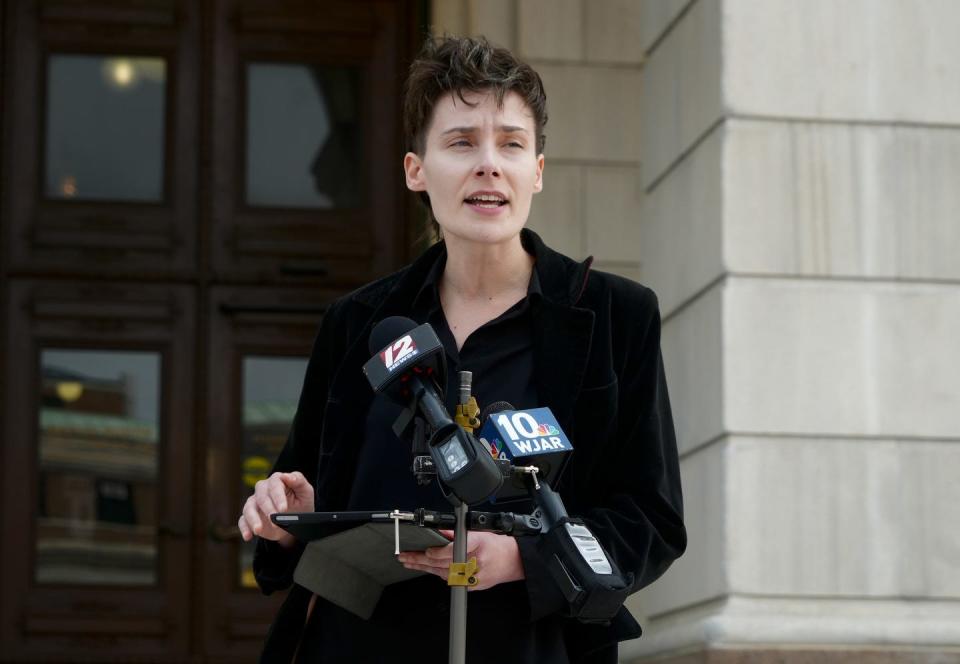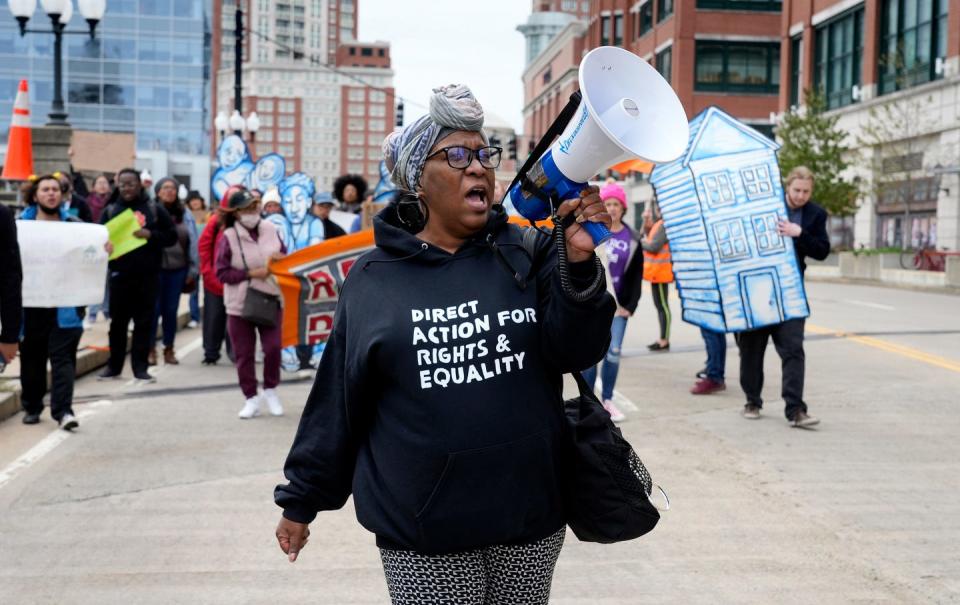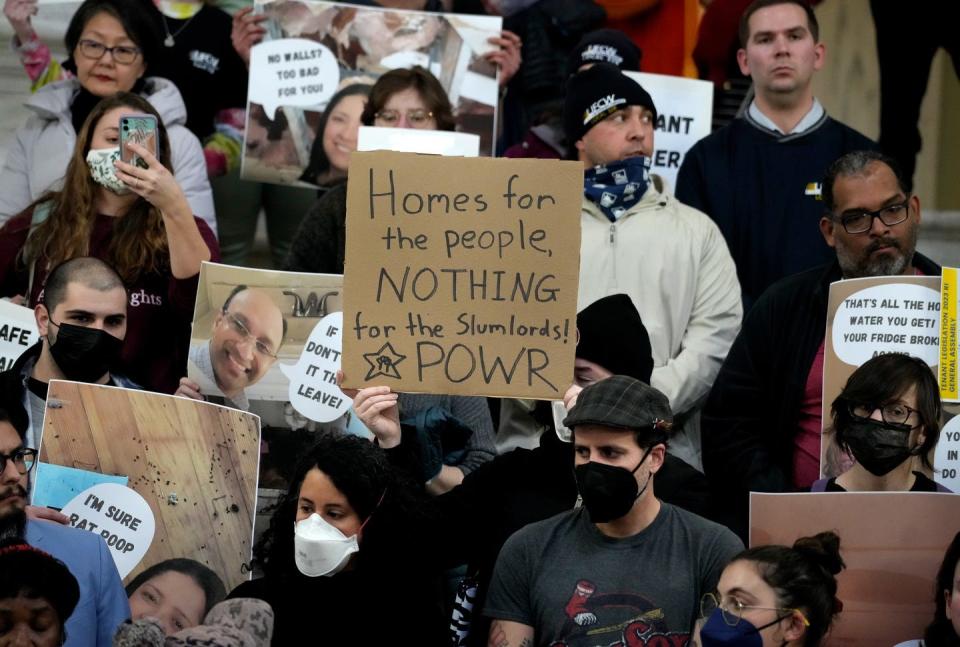Rhode Island used to have rent control. What would it take to bring it back?
One landlord raised rent from $875 to $1,800 across several apartment buildings, forcing all but three families to move out.
Another doubled a family's rent over the course of three years — at the same time that their child developed lead poisoning.
Those are just two of the examples that come to mind for Shana Crandell, a tenant organizer with Reclaim Rhode Island, when she says that rents have "have reached crisis levels, not just in Providence but across the state."
And what she's witnessed anecdotally is also backed by data: One Zillow study found that, last year, Providence saw the highest jump in rent prices of any city in the country. The typical rent for the area rose to $2,074, a 7.5% increase over the previous year, the company said.
In fact, there's only one town in the state where a two-bedroom apartment is considered affordable on the state's median income for renters, according to HousingWorks RI's 2023 factbook. (It's Burrillville.)

To activists, all this underscores the glaring, immediate need for rent control.
"The well-being of Rhode Island households depends on rent control," Crandell said. "Families are getting evicted, displaced, becoming homeless, or forgoing basic needs to pay rent to slumlords that they cannot afford."
Numerous cities across the country are considering instituting policies that place limits on how much a landlord can increase rent from year to year, and advocates here are hopeful that Providence's progressive City Council will be the first in Rhode Island to do so. State lawmakers are also proposing legislation to cap rent increases statewide, though that faces tougher odds.
Notably, while the majority of states have laws preempting cities from enacting rent control ordinances, Rhode Island does not.
We're one of only 11 states that lacks a preemption law, but also lacks any form of rent control. (By contrast, neighboring Massachusetts has a preemption law, so the push to adopt rent control in Boston faces steep obstacles.)
What's being proposed for Providence, and the rest of RI
Approximately 200 municipalities in the country have some form of rent regulation in place, according to a 2021 study by the University of Minnesota's Center for Urban and Regional Affairs. Oregon and California also have statewide rent caps.
Although these kinds of policies are commonly referred to as "rent control," proponents tend to prefer the term "rent stabilization." Historically, rent control policies dictated the specific dollar amount that landlords could charge for rent, which isn't an approach that anyone is trying to bring back.

Instead, advocates want limits on the percentage by which landlords can increase their tenants' rent from year to year.
On the state level, Sen. Tiara Mack, D-Providence, has repeatedly proposed legislation that would cap rent increases for existing tenants at 4% a year. She plans to reintroduce similar bills this year.
While most people's salaries only increase by 1% or 2% a year on average, some tenants are seeing their rent costs go up by 50% or 100%, she said.
Meanwhile, Direct Action For Rights And Equality (DARE) has also been working with attorneys and studying policies from around the country, and recently published a detailed, 20-page draft of a proposed citywide rent control ordinance for Providence.
Under the group's proposal, annual increases in base rent could not exceed 4%, or 75% of the increase in the consumer price index over the past year – whichever is lower. A Residential Rent Board would publish the maximum allowable increase on an annual basis.
Landlords could only increase the rent once each calendar year, regardless of whether tenants turn over, and they would need to have good cause for evictions. Apartments constructed after Jan. 1, 2025, would automatically be exempt.
The policy would allow landlords to pass along the costs of utilities and capital improvements to tenants, as long as the total increase in rent does not exceed 7%. The rent board would have the discretion, "in limited circumstances and in the interests of equity," to make exceptions.
"This would level out the playing field," said Kinverly Dicupe, the organizer for DARE's Tenant and Homeowner Association. "This profiteering that's going on is going to be slowed down."
DARE's proposal is backed by other groups that advocate for tenants' rights, including Reclaim Rhode Island and Providence Organization of Workers and Renters (POWR), Dicupe said. They plan to officially launch the campaign with a rally at City Hall on Thursday, Jan. 25, at 5 p.m.

"I think there’s a lot of good pieces that are in that proposal," said Providence City Council President Rachel Miller, who characterized it as a good starting point for a larger discussion about what rent stabilization could look like.
Miller, a renter herself, is broadly supportive of the idea of instituting rent control. More than 60% of Providence residents are renters, she pointed out, and evictions and homelessness have increased dramatically.
Hardly a day goes by that she doesn't hear from constituents or see social media posts "about last-minute and very high rent increases," she said.
Miller said she expects to see the City Council introduce a rental stabilization ordinance this year, but they're still in the "early stages" of discussion about what that would look like, and they will be looking to hear from developers and landlords as well as housing advocates.
More: Providence's housing market is 'cutthroat.' Even city councilors are caught in the middle.
Breaking down the debate over rent control
The argument for rent control is fairly straightforward: It protects tenants from dramatic, unexpected rent hikes that would either place them in a precarious financial position or force them to move. And, unlike other affordable-housing measures, it doesn't require millions of dollars in government investment.
The goal, Providence CIty Councilman Miguel Sanchez said, is to "protect people who have lived here and called Providence home for their whole lives."
But instituting rent control won't change the fact that there aren't enough affordable apartments to go around in the first place.
Recognizing that, advocates say there also needs to be more construction of affordable housing and public housing. But it takes time for new housing to be built, and in the meantime, rent stabilization can offer tenants some immediate relief.
"I think it’s one tool in the toolbox," Miller said.
More: Developer proposes 59 units in Federal Hill. Here's where and what they look like.
Landlords argue that it's unfair to cap rents when their expenses, such as taxes and utilities, continue to rise. In testimony submitted in opposition to Mack's bill last year, the Rhode Island Association of Realtors argued that rent stabilization would "only add pain to Rhode Island's housing crisis," because landlords would simply take their properties off the market.
"I register that as, like, a threat," Dicupe said. "And it's just like, 'OK, close up shop.' Maybe it'll make some of these homes cheaper if you leave the damn state. That's the way I view it."
Opponents also contend that limiting rent increases prevents landlords from investing in building maintenance, which means that tenants end up living in substandard conditions. But as it stands, Mack said, landlords are often raising rents without making an improvements to their buildings.
"I've been in my apartment for seven years, and my rent increased by over 25% just this year," she said. "My roof has not been replaced, my walls have not been repainted, my floors have not been redone. ...There is nothing that has changed about my apartment, and now it's $1,000 more than when I moved in seven years ago."
Mack said she understands that landlords have bills to pay and in some cases are the victims of municipalities' overreliance on property taxes. She's sympathetic to small landlords who are seeing their costs increase, she said, but rent hikes are often the result of "big corporate real estate companies coming in, buying up property, and jacking up prices."
Miller said the City Council wants to understand the factors that are driving rent increases, including tax rates. That's why an ordinance hasn't been introduced yet, she said — she doesn't see rent stabilization as something that should happen in a vacuum.
"We’re not going to propose something that comes out of nowhere," she said.
Why Rhode Island used to have rent control — and doesn't anymore
Rhode Island used to have rent control.
During World War II, the federal government imposed rent control on about 80% of the nation's housing stock. Many of those policies remained in place through the early 1950s, in response to the housing shortage caused by the pause in construction during the war.
In Rhode Island, rent restrictions finally expired in 1953, sparking a debate about whether municipalities had the authority to enact their own rent control ordinances.
Democrats, including Gov. Dennis Roberts, tried to pass a statewide rent control law that year, but it was blocked by the Republican-controlled state Senate. So some cities, including Central Falls and Woonsocket, tried to take matters into their own hands.
The attorney general's office, however, said they couldn't do that. Enacting rent control would require using "police powers" that are vested in the General Assembly and hadn't been delegated to cities and towns, Assistant Attorney General Archie Smith wrote in an advisory opinion.
The Congress of Institutional Organizations (CIO), which had pushed for emergency rent control, strongly disputed that idea. It would make the home rule charter an "empty document," CIO attorney Julius Michaelson told Woonsocket officials. But in the end, no communities challenged the decision.
Years later, in 1978, Newport considered instituting a rent control ordinance. By then, Michaelson had been elected attorney general, and he declined the city's request for an opinion on whether it could legally do so.
The attorney general "cannot serve as the lawyer for the 39 cities and towns and has generally refrained from rendering opinions on purely local matters over which he has no enforcement authority," Michaelson wrote. While he said he wouldn't challenge any rent control ordinance that Newport instituted, the city didn't end up moving forward with the idea.
'It's just not sustainable'
Since the question of whether cities can adopt rent control ordinances on their own was never tested in court, it remains something of an open question. And in Providence, Mayor Brett Smiley opposes the idea.
"While Mayor Smiley is deeply concerned about the cost of rent in Providence, rent stabilization has proven to be an ineffective policy in other communities," spokesman Josh Estrella said. "It does not control property costs, arbitrarily picks winners and losers, and often leads to unintended consequences such as reduced investments in property maintenance."
Establishing a citywide policy, in other words, would likely require a veto-proof majority on the City Council.
Miller said that she can't predict how much support there might be for a proposal that doesn't exist yet, but "housing affordability is a priority for a majority of councilors." (There are also more renters on the council than there have been in a long time, she said.)
"This is the most progressive City Council we've had in a very long time," DiCupe said. "So we do think there is a good shot."
DARE has been trying to get a rent control ordinance passed for years, she said. Now, for the first time, there seems to be some momentum.
"I think it has a lot to do with how uncontrollable rents have gotten," she said. "It's just not sustainable."
This article originally appeared on The Providence Journal: Push for rent control gains momentum in RI. Is this the year?

